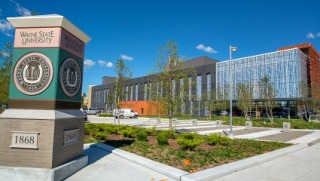Oct 14 2015
Detroit’s public, urban research university — is celebrating the opening of the Integrative Biosciences Center (IBio), a $93 million facility dedicated to studying and eliminating the many health disparities that plague Detroit’s residents. A grand opening celebration will be held at 10:30 a.m. Wednesday, Oct. 14, in the 200,000-square-foot building, which is located at 6135 Woodward Avenue in Detroit.

Wayne State President M. Roy Wilson will be joined at IBio’s opening ceremony by state and local officials, including Detroit Mayor Mike Duggan. Community leaders and public health advocates from throughout the city also will be in attendance, along with Henry Ford Health System’s leadership team, whose organization will occupy a portion of the building’s first floor.
“Rarely does a university get to live its vision and mission on a scale of this magnitude,” said Wilson. “The Integrative Biosciences Center embodies what it means to be a public, urban research university — creating and sharing knowledge that contributes immensely to improving the quality of life for its surrounding community. Research conducted in this center will also have important applications in other urban communities around the world.”
Metabolic disorders including diabetes and obesity — which disproportionately affect certain segments of the population — are among the major urban health issues researchers will focus on at IBio. Hypertension — the leading cause of America’s leading cause of death, heart disease — affects African Americans at an alarmingly higher rate than other groups. Cardiovascular disease, specifically heart disease prevention, is another area of disparity that IBio research teams will focus on.
Faculty with expertise in environmental science, bio and systems engineering, heart disease, diabetes, obesity, asthma, and biobehavioral health will work side by side at IBio. The new laboratories will also be used to recruit expert faculty from around the country to join the fight. WSU plans to recruit more than 30 new faculty members for research and development programs in integrative biosciences.
Phase 1 occupation of IBio includes research teams focused on metabolic diseases, bio and systems engineering, behavioral health, cardiovascular health disparities, a clinical research center with a disease-specific biorepository, and the Center for Urban Responses to Environmental Stressors, which is supported by the National Institute of Environmental Health Sciences.
Wayne State Vice President of Research Stephen Lanier believes IBio researchers have an opportunity to create a national center of excellence for a number of the diseases ailing Detroit’s population in far greater numbers than the rest of the country.
“All of the research teams — environmental sciences, biobehavioral health, cardiovascular health, metabolic disorders, bio and systems engineering, and systems biology — will be working together toward discoveries that have a translational impact on the community,” said Lanier. “IBio was designed not only to give researchers world-class lab space but, more importantly, to engage broadly with the communities that we serve through prevention, education and partnering.”
Situated in Midtown on a previously abandoned 2.7-acre city block, IBio spans from Cass to Woodward Avenue and features more than 200,000 square feet of lab and clinical space designed to foster a collaborative and flexible approach to research.
“The building was designed to foster collaboration among researchers,” said Wilson. “Being very open is a key feature of science today. We want our researchers talking to each other about what they are working on. Someone will say, ‘I’m working on this,’ and someone else will say, ‘Have you tried this?’”
IBio is strategically positioned near TechTown, Wayne State’s business incubator, on the north side of campus. The university’s ultimate vision for IBio is to move discoveries and technologies from the laboratory to the community.
The center, which is representative of WSU’s broad engagement in economic development in Detroit, is expected to create both temporary and permanent jobs housing more than 400 individuals. Estimates show it will result in approximately $40 million in new earnings annually in Michigan — 98 percent of which will be in metropolitan Detroit.
Designed by the architecture firm Harley Ellis Devereaux, IBio includes 127,000 square feet of renovated and repurposed space from the former Dalgleish Cadillac dealership building, which was designed by famed architect Albert Khan. An additional 78,000 gross square feet of new companion building fronting Woodward Avenue was constructed for the project.
The state of Michigan provided $30 million in capital outlay funding for the project.
IBio was designed in accordance with the United States Green Building Council’s 2009 LEED Standards for New Construction and Major Renovations and received a LEED Silver rating.